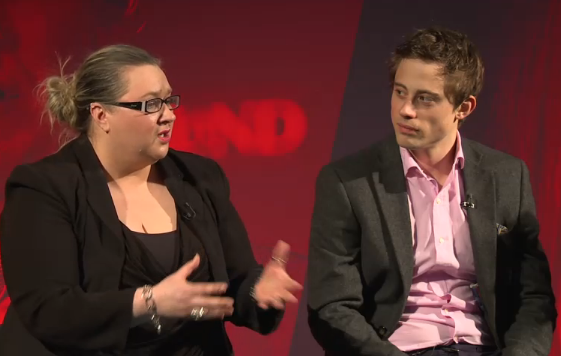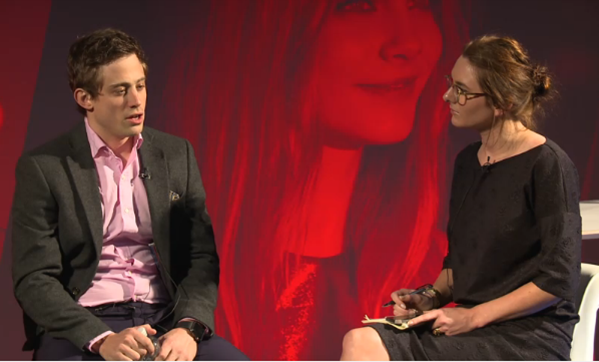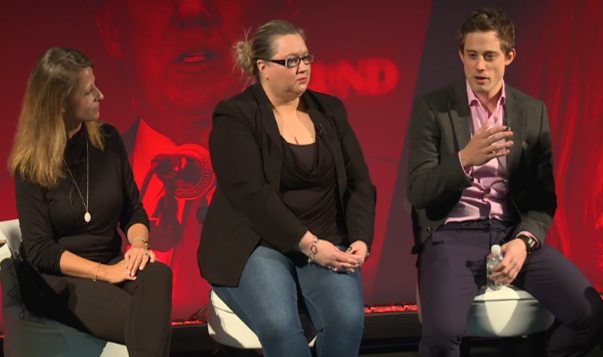Former apprentice star & agency innovators warn brands & agencies to make responsibility a mind-set.
Today, Christie H.Kristensen from Creativepool hosted a session at Advertising Week Europe exploring how an innovation mindset helps brands to inspire real changes in consumer behaviour and also helps them to be seen to be “responsible”.
Kicking off the discussion, with a definition of what responsible marketing is, was Lena Robinson, co-founder of KiwiGray, who said: “Responsible marketing is about accountability, about brands being authentic and transparent and taking responsibility. It can’t just be something a brand pays lip service to – it needs to be a purpose / to sit at the heart of the business.”
Katie Ewer, writer and stratigic director at jones knowles ritchie agreed, saying that responsibility shouldn’t just be about saving the rainforest or adhering to the latest regulations and restrictions per say – instead she said that: “responsible marketing is about truth telling, and telling that truth well.”
Nick Holzherr, former Apprentice finalist and CEO at Whisk.com added: “It’s ultimately about not deceiving customers”.

The panel discussed how ‘responsible marketing’ shouldn’t be something owned by an individual team but something to be implemented from the heart of the business in support of a vision. They warned that it may need bravery from the brand, and should always be proactive rather than reactive.
Unilever was singled out as being a great example of a brand that has put responsibility in its fuller sense at its heart to great effect. But Nick Holzherr suggested that brands can do more – particularly when it comes to the use of data.
Nick, who raised over $2m in funding from technology investors for Whisk after pitching the business to Lord Sugar following the final of the BBC Apprentice 2012 (having achieved the series' best task-win record), made a strong case for top-level data use. However, he warned that brands also need to be responsible with how they use consumer data to create and executive innovative engagement programmes.
Nick argued that too many brands & agencies are using the wrong feedback loops. Quoting Ev Williams of Medium, who said that advertising is a bit like junk food – if you measure on calorific intake then you’ll optimise to give as much junk food as possible, but if you measure on how nutritious the food is you will optimise for a completely different thing – Nick warned that brands need to be smarter about what they are measuring.

Adding to the warning about data, the panel talked about how innovation won’t necessarily succeed if it is just seen as tech. Lena argued that innovation as a mind-set not an execution is what will give brands/businesses the completely different viewpoint they need in order to be responsible. She also said that listening and responding to what consumers are saying will make it far easier to be seen to be responsible.
Consumers will always vote with their feet / their wallets. With brands ultimately in the business of making money – something Nick was keen to reinforce they should focus on, the panel suggested that brands and agencies will need to respond to the changes in spending if they are to stay in business. And for those agencies struggling to find the brands with briefs that enable them to be responsible, Katie urged setting the briefs themselves.

On the future of responsible marketing, the panel said brands need to be brave enough to both embrace any changes needed and actually make them.
Katie pondered whether we will see the rise of a group of ‘backlash’ brands – brands that celebrate their appalling nutrition values, just to cut through the noise. However all the panel agreed that consumers are more willing to buy from authentic, responsible brands.
As all the data sources come closer together, the panel suggested that responsible marketing will become easier but also more challenging. The biggest issue for brands is to ensure they are listening and learning from all parties.
Consumers will ultimately drive the rise of responsible marketing but agencies and brands can help get everyone to the same place. It’s a three-way relationship that is still evolving and everyone needs to be conscious of that.

The panel concluded that putting responsibility at the heart of the business and aligning your purpose to a responsible mind-set is the best way for brands to progress rather than shifting tactics in response to what they believe are the latest trends. Do you agree?
Check out the session in full here and let us know what you think.


